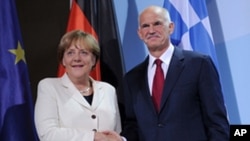Stock markets are rallying in expectation that European governments are finally committed to a comprehensive solution to their spreading debt crisis. Two of the most reluctant countries - Germany and Finland - are expected to vote this week for expanding a key bailout fund.
Time is running out for Greece to receive more bailout funds to avoid defaulting on its debt. But expectations are also rising that European governments are finally responding to calls that they take bigger and bolder steps to tackle a spreading financial crisis in the 17 nations sharing the euro currency.
In the coming days, European and International Monetary Fund officials will be assessing Greece's progress toward pushing through tough austerity measures in return for more funds. Analysts and markets are also zeroing in on Germany, Europe's biggest economy, where opposition has been growing about bailing out Greece and other debt-strapped countries.
But there is a widespread expectation the German parliament will back expanding the European Union's bailout fund during a crucial vote, Thursday.
Underscoring the importance of German support, Greek Prime Minister George Papandreou held talks with German leader Angela Merkel on Tuesday. He also appealed for help, in an address to German industries.
"This crisis must unite us to make Europe a stronger Europe - one that lives up to the common aspirations of our citizens. I am confident that Greece will have undergone this same remarkable transformation achieve in Germany during the early 1990s. What we are doing is nothing short than the rebirth of a nation," he said.
News reports suggest a larger plan for dealing with the debt crisis is being crafted. But European officials have dampened those expectations. And, a number of eurozone governments have yet to ratify a July decision to expand the bailout fund, which they need to do within weeks.
Even if they do, analysts like Simon Tilford, of the Center for European Reform in London, say the expanded fund will not be enough to deal with debt problems in bigger economies, like Italy.
"I think that, at this juncture, they're certainly far behind the curve," he said. "They obviously need to agree to what they signed up to in July. But that's not going to be anywhere near enough to prevent the crisis deepening and perhaps barreling out of control."
The United States and other countries are increasingly concerned that Europe's debt crisis will have far-reaching effects. President Barack Obama and his administration have been pressing European leaders for tougher action.
"They have not fully healed from the crisis back in 2007 and never fully dealt with all the challenges that their banking system faced. It's now being compounded with what's been happening in Greece. So they're now going through a financial crisis that is scaring the world," he said.
Underscoring the international concern, Japan's finance minister has suggested his government might help in bailing out Greece - if European leaders draft a plan that will calm the markets.
Europe Moves Closer to Expanding Greek Bailout




